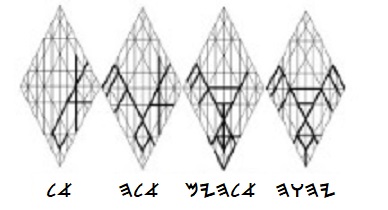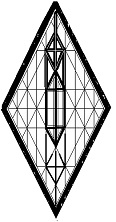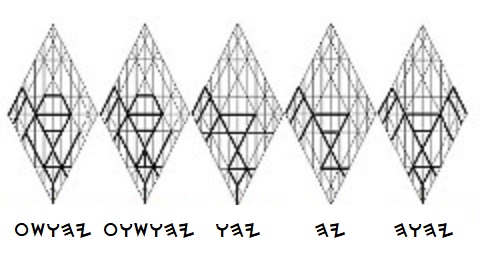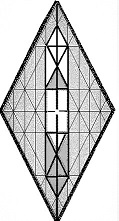Thoughts of God and of Man

Our la is hla. He is not the father, though God’s eternal divinity is instigator of all created things. la is not the mother, though our hla is the eternal well of divinity from which all things originate; neither
is hwla the son, though myhla projects his essence into temporal realms to perform the works of divinity. la is not a spirit that is distinct within a consortium of divine spirits; for la, a formless unity, is the source, the substance, and the holiness of all that is.
Our la is la. There is no other, and any attempt to define myhla creates idols in our minds. hla can be known, loved, and worshiped; but hwla cannot be defined by being stuffed into a word or into a book of words, as scriptures testify.
In parables, the scriptures speak of differentiation within divinity, such as God the father, AL Shaddai, and Lord of Hosts; but the distinctions concern principles within a singularity, not discrete spirits who, together, comprise the godhead or a structured commonwealth of gods.
The word Elohim myhla is a collective plural that speaks of the attributes of HaShem. Elohim is a singularity a that guides, defends, and teaches l the living h. Sharing y his counsel m, he intervenes a by his rod l or his staff h, offering the gift y of freedom to his people m.
The Elohim are faces of HaShem: they are the garments through which he addresses creation; they are not his surrogates. As the creator, the great I AM has prepared each of us to fulfill many roles and functions in our lives on earth.
We know within ourselves that we are who we are when we are what we are; and we know that we will be that which we are becoming. Should HaShem be subject to some limitation that does not apply to us? No; for we are made in the likeness of HaShem, and we shall grow unto congruence with his image.
The inward diversity we experience within ourselves each day does not require our efforts. It unfolds in a seamless profile that carries the savor of our essence. Minds and emotions change continuously in response to our hearts. We are accustomed to change. We act, and we react; but in all that we do, as with all that is done in us, we are one.
As created beings, we are specimens; but as Sons of Man, we are the begotten children of HaShem: we share the singular, only-begotten Breath of Life passed to us from Adam, the Son of God. We descended to earth, and we will ascend to heaven, yet again.

Immersed in the Breath, we live as though impaled within it, even as it is seated within us. Believer or non-believer, we magnify HaShem; for by coming to earth, we became finite portals of the infinite.
Immortal worms of fire that descended to earth for incarnation, we put on mortality to wear it out in the quest for the immortality we claim to be our destiny, an inexplicable belief were it not for the presence that hides between our breaths. When mortality shall reach its end in us, we will have come to perfection as pure expressions of The Name.
Just as la is beyond definition by man, he is also beyond being named by man. However, because man has need to call upon the eternal one, myhla chose hwhy as the name of address because of its oracular properties.
For my part, I trust that hla tolerates traditional use of “HaShem mch” in informal address because of my fondness for its poetic properties. I trust, also, that the father will overlook lapses into my childhood habit of using “God” as a term of reference. We are to make no man an offender for a word, regardless of its etymology.

The Name hwhy speaks of the one who gives y life h in order to sustain w the living h. The Name is both cause hy and effect hw—that is to say, it is both the action hy and the counterbalancing
reaction hw.
Interpretation of “The Name” answers to the context in which it appears, as detailed in Torah by the apostle Moshe hcm, who came as the reflection of HaShem mch on earth, charged with the task of preparing a people capable of honoring the coming of The Name’s projection, which is Mashiyach Yahushua owcwhy, the shout owc of w father Yah hy, as affirmed in the ministry of anointed
Y’shua ocwhy, crowned with the salvation ocy of father Yah why.
Each of us existed in the mind of la before the doors to heaven and earth materialized in answer to HaShem’s word, within which father hy laid down his eternal life and godhead to be projected
as owcwhy into temporal realms. Yahushua HaMashiyach is the Shout owc—the Vigor why, the exercise—of the father’s enunciated will, which seeded temporal realms with beings capable of housing eternal spirit. To that end, Eloah hwla lifts a remnant of every generation unto congruence, the standard for everlasting life.
Some argue that the etymology of Yahushua should render that name into English as “the Cry—the
sob—owc of w Yah hy,” an interpretation that would disqualify the name from consideration as the name of HaMashiyach. Expressing emotional notions based on tribal pronunciation, many will claim knowledge of messiah but will be turned away because they never heard the clear ring of HaShem’s one-and-only battle cry.
Words are bodies of thought, and the Name Yahushua is the “embodiment” of the father’s thoughts concerning salvation. The battle cry is the garment, the Logos, the reality: it’s the angel of the presence of HaShem. It’s the ineffable, taking form.
As savior and deliverer of temporal realms, Yahushua HaMashiyach raced through the universe as it opened before him. As his feet landed and lifted within its vast expanses, we who followed were dislodged in his wake; and we fell to ground as sparks raised by the footfalls of his heels.
In the footsteps of the word, we became his seeded words; and we were scattered throughout the temporal realms of creation. Becoming forgetful of our origins, we also lost track of the divine presence that fuels the spark of life in us through the whisper of the names we are given; and we fell, ever deeper, until we became planted within a darkness we couldn’t understand and could not escape.
Disoriented by the hazy expanses of temporal realms, we became deluded by specters and shadows we imagined in the half-light of our own perceptions; and we began thinking of la as a strange, unapproachable, exterior reality— a confusion by day and a terror by night.
Anticipating such weaknesses, HaShem determined from the beginning of creation that he would dwell in the thick darkness of our hearts. We may feel utterly lost, but our hearts are God’s footstool; and our lives unfold in response to the warmth of his feet. Our minds are God’s throne, allowing us moments of great illumination in the pastures of earth, even when pressed by the heaviest distractions of the temporal.
If we are to resolve the confusion that envelops us in moments of doubt, we must accept that hwla is already within us: even if we have no workable conception of what that means. That simple step of faith is a holy call upon the godhead to reveal its presence in times and circumstances that are useful for our healing.
Because hwla has always been with us as ImmanuAL lawnmo, the hidden presence of messiah that ascends and descends as he walks within us, we are prepared to hear Yahushua’s silent voice when it calls for our attention, knocking upon our hearts, asking permission to be born again.
 We
are pre-schooled in the ways of divinity by our experiences in temporal
realms. All things that are made— with their forms, their operations,
and their interactions— are parables concerning the astounding
practicality of divinity.
We
are pre-schooled in the ways of divinity by our experiences in temporal
realms. All things that are made— with their forms, their operations,
and their interactions— are parables concerning the astounding
practicality of divinity. What is written can lead us to God only as it is imprinted on our hearts by the lives we live. It is the call of hwla, the parable of father and son that brings our la nearer. The scriptures preserve the record; but to be effective, the parable must be lived.
Only acceptance that we are the outcome of God’s projection breaks down the wall of division raised by the confusion of incarnation. Only our willingness and agreement to abandon our expectations and to walk in the steps of God’s projection will bring us to Golgotha, the Mount of Salvation; for it is there we nail the temporal to the eternal and fully accept the process of redemption.